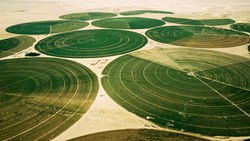Saudi must look east for grains
by RJ Whitehead
The contribution of agriculture to Saudi Arabia’s gross domestic product was last measured at 2.49% in 2010, according to the World Bank. Moreover, it is set to drop even lower once the country’s cultivation of wheat is phased out by 2016.
Fearful of this, and the country’s own food security in doubt, the Saudi government has set out on an outward-looking path of investment in agriculture and food processing.
Looking overseas
The director of the King Abdullah Initiative for Saudi Agricultural Investment Abroad, Saad Khalil, says that Saudi Arabia is looking to invest in 35 countries across the world.
“Since the launch of the initiative in 2009, the fund’s work has been conducted in several stages,” said Khalil at Gulfood earlier this month. “The first phase involved visiting and surveying the targeted countries on a ministerial level accompanied by technical teams that are directly involved with the initiative.”
The initiative has been seen as a massive shift in government agricultural strategy as it moves to phase out a 30-year programme to reach self-sufficiency in wheat and other crops.
That goal has been reached, but in doing so, it has also depleted much of the kingdom’s scarce supplies of aquifer water. And with the ongoing phasing out of production, Saudi will become fully dependent on imported wheat from overseas destinations by 2016.
The country is expected to import 1.96m tonnes of wheat for human consumption for the period between 2012 and 2014, according to estimates by the US Department of agriculture.
So far, 31 countries have approached Saudi to host Saudi partnerships. However, the political turmoil across a number of Arab countries has forced Saudi investors to look east to source investments.
A Saudi food firms have so far invested in Sudan, Lebanon, Syria and Egypt, but their respective political situations have forced investors to look for alternatives, with Pakistan and Australia looking to be a good fit.
The King Abdullah Initiative helps Saudi companies to buy large areas of land in countries with the natural resources needed to develop their agriculture industry. But because Saudi private sector companies have traditionally been cautious about investing in agriculture, the initiative hopes to encourage them to invest by offering interest-free loans and strategic partnerships through the state-owned Saudi Agricultural and Livestock Investment Company.
Favoured successors
Pakistan has enjoyed long trading links with the kingdom, and the Saudi government and a number of Saudi businesses have already bought up hundreds of thousands of acres of Pakistani farmland. But such investments have brought criticism from groups like the Asian Human Rights Commission, which is concerned about the south Asian country’s own pressing food security issues.
Meanwhile, a large number of Saudi agriculture businesses have already invested in Australia for wheat imports. What’s more, research trials have confirmed Australian wheat is highly suited to the production of flat breads, which are preferred by millions of Saudi Arabian consumers.
According to Robert Loughman of the Australian Export Grains Innovation Centre, Australia currently makes up only a small portion of Saudi’s 2.5 million tonne total annual import with 350,000m tonnes of Australian wheat exported to the country last year. But this number is set to grow as the kingdom looks to bolster its own grain security.













